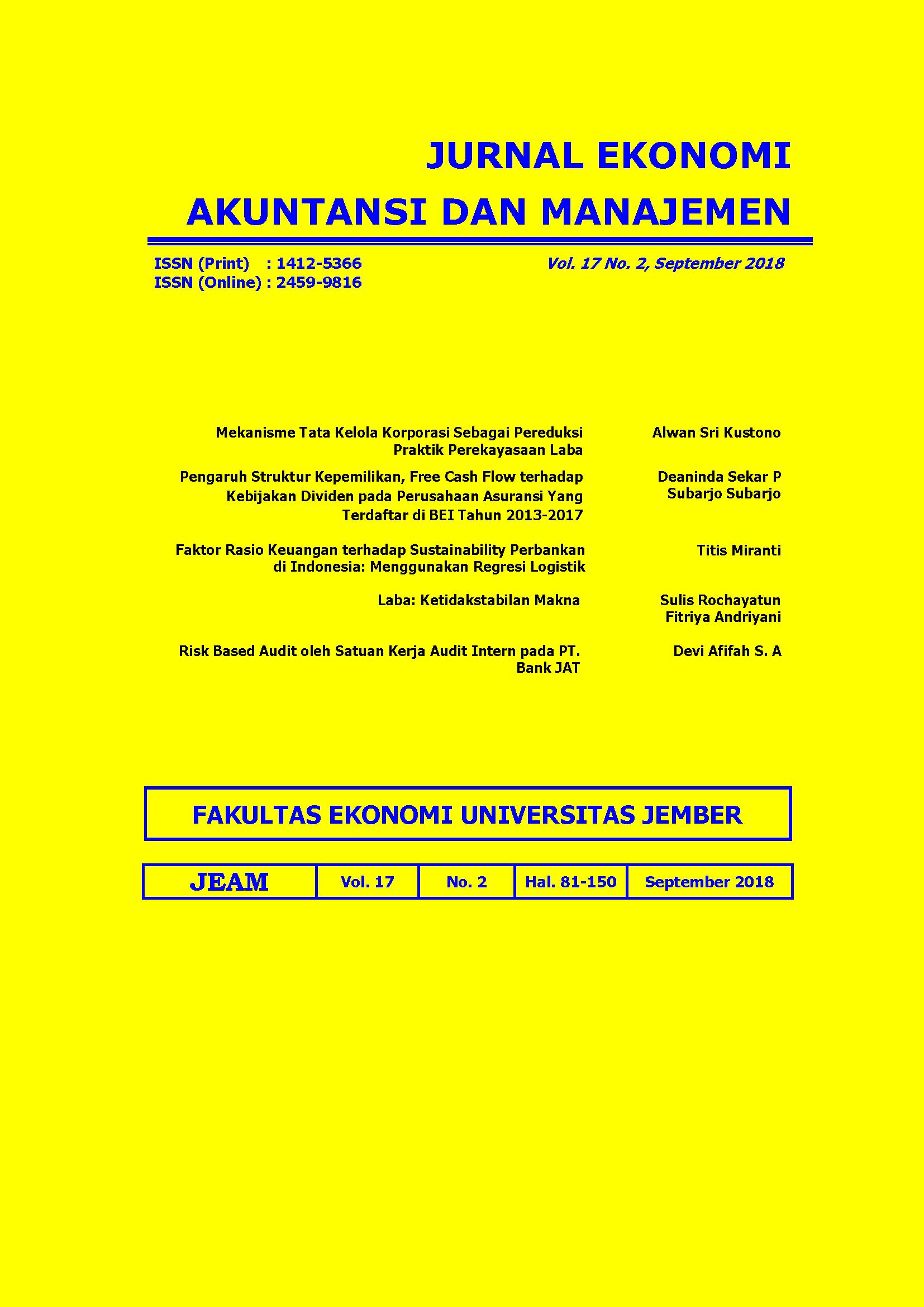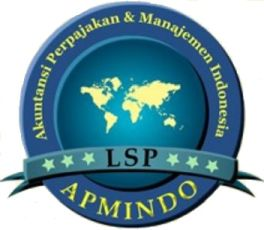Laba: Ketidakstabilan Makna
Abstract
The purpose of this study is to find out how accountants and non-accountants interpret earnings, and what the reality behind the interpretation. Reality in the accounting profession and students of SMK Akuntansi establish a perception that profit is matching between income and expense (syntactic). Profit is a form of cash proceeds, an increase in economic capability, and a representation of company performance (semantics). Profit is also considered an indicator of corporate success and a tool for controlling management (pragmatics).
The results of this study indicate that profit has the meaning of denotation and connotation. Profit not only contains elements of materialism, not only as a form of capitalism, naum profit also contains elements of humanism. The reality of accountants results in the perception that profit is the matching between income and expense. In contrast to these conditions, the reality of non-accountant actually shows more aspects of humanism. These perceptions all have their own truths. This is because the reality that the informants refer to is also different. Thus we know that the meaning of the profit "text" is unstable.
Keywords: Earnings, Profit, Unstable, Perception
References
Allen, Graham. 2003.Roland Barthes. New York: Routledge, 2003.
Aminuddin. 2015. Semantik Pengantar Studi Tentang Makna. Bandung: Sinar Baru Algensindo.
Azwar, M. (2014). Teori Simulakrum Jean Baudrillard dan upaya pustakawan mengidentifikasi informasi realitas. Jurnal Ilmu Perpustakaan & Kearsipan Khizanah Al-Hikmah, Vol. 2 No. 1, hlm. 38-48.
Barthes, R. 1977. Image Music Text. London: Fontana Press. Barthes, R. 1991. Mythologies. New York: The Noonday Press.
Bazan, Ariane. 2013. On the Physiology of Jouissance: Interpreting the Mesolimbic Dopaminergic Reward Functions From A Psychoanalytic Perspective. Hypothesis And Theory Article.
Belkaoui, A.R. 1980. The Interprofessional Linguistic Communication of Accounting Concepts: An Experiment in Sociolinguistic. Journal of Accounting Research 18 (2) Autumn: 362-374.
Belkaoui, A. 1989. Accounting and Language. Jurnal of accounting literature vol.8 (281-292)
Burrell, G. Dan G. Morgan. 1979. Sociological Paradigms and Organisational Analysis. Ashgate Publishing Company. USA.
Cassirer, Ernst. 1955. The Philosophy of Symbolic Forms. London: Oxford University Press.
Creswell, John W. 2014. Research Design Pendekatan Kualitatif, Kuantitatif, dan Mixed. Yogyakarta
: Pustaka Belajar
Cummings, Louise. 1999. Pragmatic, A Multidiciplinary Perspective. New York: Oxford University Press Inc.
Derrida, J. 1978. “Structure, Sign, and Play in the Discourse of the Human Science”. Terjemahan dalam Bahasa Inggris (Allan Bass): 1-13. Ringkasan Esai. Bagian dari Writing and Difference (pp. 278-294). Montreal.
Dreyfus, H.L. 2005. Companion to Heidegger. Australia : Blackwell Publishing.
Fanani, Fajriannoor. 2013. Semiotika Strukturalisme Saussure. The Messenger, Vol. V, No.1. Friedman, Milton. 1982. Capitalism and Freedom. The University of Chicago Press, Ltd., London Harlan, Richard. 2006. Super Strukturalisme : Pengantar Komprehensif pada Semiotika, Strukturalisme, dan Postrukturalisme. Jakarta, Bandung : Jalasutra.
Ikatan Akuntan Indonesia. 2017. Standar Akuntansi Keuangan. Jakarta : Salemba Empat
Indriantoro, N. 1999. Aliran-Aliran Pemikiran Alternatif dalam Akuntansi. Jurnal Ekonomi dan Bisnis Indonesia, Vol. 14 No.03.
Irianto, Gugus. 2006. Dilema “Laba” dan Rerangka Teori Political Economy of Accounting (PEA), TEMA, Vol.7, No.2, hal 141-153
Iselin, E. R.. 1971. The Objectives of Accounting in an Accounting Theory Based on Deductive Methodology. St.Lucia. University of Queensland Press
Kamayanti, Ari. 2016. Metodologi Penelitian Kualitatif Akuntansi. Jakarta Selatan: Yayasan Rumah Peneleh Kovacs, Z. I. 2012. Accounting-Profession vs Science. Focus on Accounting; hal 426-436.
Kuhn, T.S. (2002): A tudományos forradalmak szerkezete (The Structure of Scientific Revolutions). Osiris, Budapest
Kutha Ratna, N. 2010. Teori, Metode, dan teknik Penelitian Sastra. Yogyakarta : Pustaka Pelajar.
Macintosh, N.B., T. Shearer, D.B. Thornton dan M. Welker. 2000. Accounting as Simulacrum and Hyperreality: Perspectives on Income and Capital. Accounting Organization and Society (25): 13-50.
Moleong, L.J.. 2004. Metodologi Penelitian Kualitatif. Bandung : PT.Remaja Rosda Karya Muhajir, N.H.. 2002. Metode Penelitian Kualitatif. Rake Sarasin : Yogyakarta
Mursy, Austina Luckyta. 2013. Jurnal Akuntansi Multiparadigma, Vol.4, No.2, hal 165-176
Nadeem; et.al. (2011). Teacher’s Competencies and Factors Affecting the Performance of Female Teachers in Bahawalpur (Southern Punjab) Pakistan. International Journal of Business and Social Science 2 (19), 218.
Olaleye, & Oluremi, F. (2013). Improving Teacher Performance Competency Through Effective Human Resource Practices In Ekiti State Secondary Schools. Journal Of Business Economics, and Management Studies 1(11), 125.
Piliang, Y.A. 2003. Hipersemiotika: Tafsir Cultural Studies Atas Matinya Makna. Bandung: Jalasutra.
Piliang, Y.A. 2004a. Dunia Yang Dilipat: Tamasya Melampaui Batas-Batas Kebudayaan. Yogyakarta dan Bandung: Jalasutra.
Piliang, Y.A. 2004b. Posrealitas: Realitas Kebudayaan Dalam Era Posmetafisika. Yogyakarta dan Bandung: Jalasutra.
Rahmat, Muhhamad. 2010. Pengungkapan Public Cost and Benefit dalam Perspektif Nilai Mahabbah (Cinta).
Skripsi. Malang: Program Strata 1 Universitas Brawijaya.
Ramlan, M. 2005. Ilmu Bahasa Indonesia Sintaksis. Yogyakarta: CV.Karyono
Riduwan, Akhmad. 2012. Realitas Dalam Cermin retak: Laba Akuntansi Dalam Bingkai Penafsiran Praktisi Bisnis Non-Akuntan (Studi Hermeneutika-Kritis). Sinopsium Nasional Akuntansi XV
Riduwan, Akhmad. 2010. Semiotika Laba Akuntansi: Studi Kritikal-Posmodernis Derridean. Jurnal Akuntansi dan Keuangan Indonesia, Vol.7, No.1, hal 38-60
Roslender, Robin. 1992. Sociological Perspectives on Modern Accountancy. London and New York: Routledge Salim, A. 2006. Teori & Paradigma Penelitian Sosial. Yogyakarta: Tiara Wacana.
Sari, Dian Purnama. 2010. Tafsir Hermeneutika Intensionalisme atas “Laba” Yayasan Pendidikan. Tesis Universitas Brawijaya: Malang.
Sari, Dian Purnama. 2010. Tafsir “Keuntungan” bagi Profesi Dokter dengan Pendekatan Hermeneutika Intensionalisme. Sinopsium Nasional Akuntansi XIII
Sarup, M. 2008. Panduan Pengantar Untuk Memahami Post-Strukturalisme dan Posmo-dernisme. Cetakan I. Yogyakarta: Jalasutra.
Saussure, F.D. 1959. Course In General Linguistics. New York: Philosophical Library.
Shukla, S. 2014. Teaching Competency, Professional Commitment and Job Satisfaction - A Study of Primary School Teachers. Journal of Research and Method in Education (4), 44-64.
Sitorus, J.H. E. 2015. Dekonstruksi Definisi Akuntansi Dalam Perspektif Pancasila. Jurnal Akuntansi Multiparadigma.
Sobur, A. 2001. Analisis Teks Media: Suatu Pengantar Untuk Analisis Wacana, Analisis Semiotik dan Analisis Framing. Bandung: PT Remaja Rosdakarya.
Subanar, Harimurti. 2001. Manajemen Usaha Kecil. BPFE, Yogyakarta
Suwardjono. 2005. Teori Akuntansi: Perekayasaan Pelaporan Keuangan. Edisi Ketiga. Cetakan Pertama. Yogyakarta: BPFE.
Triyuwono, Iwan. 2006. Perspektif, Metodologi dan teori Akuntansi Syariah. Radja Grafindo Persada: Jakarta. Wild, J.K. 2005. Analisis Laporan Keuangan. Jakarta: Salemba Empat
Woods, Peter. 2006. Succesful Writing for Qualitative Researchers. London and New York: Routledge Yule, George. 1996. Pragmatics. New York: Oxford University Press.





